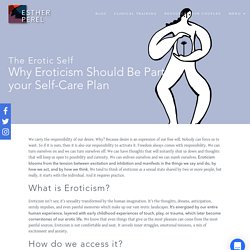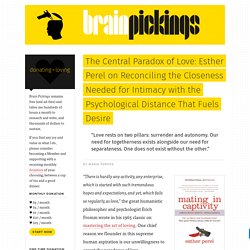

Avoidant Attachment, Part 1: The Dependence Dilemma. Editor’s note: This article is the first in a two-part series.

See Avoidant Attachment, Part 2: The Downside of Preservation. We’re in a relationship, and we feel nothing. Or we gather an ever-growing stockpile of resentment, invoking various strategies to escape intimacy without actually rejecting our partner or escalating into conflict. Does this sound familiar? While romantic relationships may start off with blissful ease, the dependence of connection can eventually feel threatening. Avoidant Attachment, Part 2: The Downside of Preservation. Editor’s note: This article is the second in a two-part series.

See Avoidant Attachment, Part 1: The Dependence Dilemma. When we live in a continual state of freeze, we aren’t only hiding, we are living alone (even when we’re in a relationship). Focused on the preservation of Self and resources, driven by self-sufficiency and independence, we come to believe that outside support is not an option. From the outside, it may seem as if we are hoarding food, money, time, words, emotions, and so on. It can also be framed as a conservation of resources in a closed (isolated) system that does not expect any exchange of resources between systems. With limited resources, efficiency becomes paramount. The Myth of Functional Dissociation The freeze state, which prepares us to hold and preserve until safety or support arrives, is a very efficient survival response.
While in many cases this happens automatically, we may also feel as if we’ve mastered dissociation. Communication Resignation “See me. Why Eroticism Should Be a Part of Your Self-Care Plan. We carry the responsibility of our desire.

Why? Because desire is an expression of our free will. Nobody can force us to want. So if it is ours, then it is also our responsibility to activate it. Freedom always comes with responsibility. What is Eroticism? Eroticism isn’t sex; it’s sexuality transformed by the human imagination. Esther Perel on Workplace Dynamics. In This Relationship What Is "I" and What Is "We"? - Esther Perel Global Media & Gimlet. Cultivating Desire. Mating in Captivity: Attachment Security & Erotic Life in Couples. Attachment Theory. Fluidity of Desire. The Fluidity of Desire with Esther Perel - Podcast.
A native of Belgian, fluent in nine languages, and a penetrating observer of the social and cultural patterns shaping our relationships, Esther is a practicing psychotherapist and organizational consultant to Fortune 500 companies.

Her 2013 TED talk, “The Secret to Desire in a Long-Term Relationship,” attracted more than a million views in the first month after its release. Her second TED Talk, “Rethinking Infidelity: A talk for Anyone Who Has Ever Loved”, was equally well-received. Combined, her TED talks have received approx. 10 million views. In today’s episode, Esther and I spoke about: Her definition of desire; the importance of owning desire and how to connect to our own desiresWomen are socialized for connection and the associated vulnerability of the inability to connect to selfExperiencing freedom from perfection without the guiltImagination complementing reality in relationshipsWhat women can hold onto for stability in the ever increasingly gender-fluid era.
Transcript CP: Yes. Love/Lust Split, Emotional History, and How You Are Loved. “Tell me how you were loved and I will tell you how you make love,” sexuality expert, therapist, and author of The State of Affairs, Esther Perel said in a backstage conversation at our In goop Health wellness summit in June. It’s a line that’s stayed with us since, and came again to the surface at an intimate dinner where Perel and GP led a secret, women-only sex talk in celebration of the new Netflix show Gypsy, alongside creator Lisa Rubin; much of the conversation centered around common relationship roadblocks.
Still intrigued, we asked Perel to do a deeper dive into the roots of some of these issues, like: Why is it that many women don’t seem to know what they want? Where does the sense of being disconnected from your own body stem from? How can it be so hard to talk about sex with our partners? ‘Dear Sugars’: Sexless Relationships. Erotic intimacy often wanes in long-term monogamous relationships, but it’s especially confusing when your partner remains loving and affectionate.

In this week’s episode, a letter writer who calls herself “About to Burst,” writes about the dual pain of emotional and physical stonewalling. “Increasingly I struggle with thoughts of cheating, and yet I don’t want to leave, I love my partner deeply,” writes “About to Burst.” She asks the Sugars, “Is there a path for us to a place of intimacy and connection? Or do I need to face the fact that it’s time for me to move on?” What Women Need to Hear about Desire. Sexuality expert and therapist Esther Perel has a way of re-conceptualizing ideas that feels like a massive paradigm shift, every single time.

We got to see her in action at In goop Health (you can watch her behind-the-scenes here), and she also co-hosted an intimate dinner with GP and Lisa Rubin for the female-directed and led Gypsy, out from Netflix now. The all-women dinner, which revolved around sex, relationships, and the owning of desire, inspired the Q&A below. Her answers urge us not only to change the conversations we have with our partners, but the internal ones we replay constantly in our mind. “If you don’t want to make love to yourself,” Perel asks, “why would you welcome somebody else to do so?” Esther's Sessions Live 2018 Masculinity Paradox. TU 81: The Paradox of Masculinity with Guest Esther Perel. Can men be BOTH Relational and Masculine?

It couldn’t be a more important time for thoughtful, honest, and provocative discussion on what it means to be a man in today’s culture. Perel makes a case that men are both harmed by the existing power structures and perpetuate harm by the codes imposed on them by all of us. In 2018 there are many contentious ideas about masculinity and “the male code” including confusion by men about how to hold themselves out as safe and masculine during this time of #MeToo and Kavanaugh. Esther Perel, named by Oprah as one of the 100 Supersoul visionaries joins Therapist Uncensored’s hosts Ann Kelley and Sue Marriott in a daring discussion about the modern man at the precipice of historic mid-term elections in the United States. Can women discuss this without “womensplaining” and what is the difference?
Perel also gives a glimpse into the backstory of her next Sessions Live event, the Masculinity Paradox. An Intimate Session on Awakening Desire. Developing Erotic Intelligence. Erotic Intelligence: The Paradox of Intimacy & Sexuality. What Your Upbringing Says About Who You Are in Bed. Esther Perel on Sexual Desire and Successful Relationships. Why do people cheat? Relationship expert Esther Perel talks to Tony about infidelity, intimacy and the danger of expectations Posted by: Team Tony Listen on iTunes Listen on iTunes Why do people cheat?

Even those in happy marriages? We tend to think that the act of infidelity is the ultimate betrayal. Esther Perel: The secret to desire in a long-term relationship. Esther Perel - Therapist / Author / Speaker / Thought Leader. The Central Paradox of Love: Esther Perel on Reconciling the Closeness Needed for Intimacy with the Psychological Distance That Fuels Desire. “There is hardly any activity, any enterprise, which is started with such tremendous hopes and expectations, and yet, which fails so regularly, as love,” the great humanistic philosopher and psychologist Erich Fromm wrote in his 1965 classic on mastering the art of loving.

One chief reason we flounder in this supreme human aspiration is our unwillingness to accept the paradoxes of love — paradoxes like the necessity of frustration in romantic satisfaction and the seemingly irreconcilable notion that while love longs for closeness, desire thrives on distance. How to live with those paradoxes, rather than succumbing to the self-defeating urge to treat them as problems to be solved, is what Belgian psychotherapist and writer Esther Perel explores in Mating in Captivity: Unlocking Erotic Intelligence (public library).